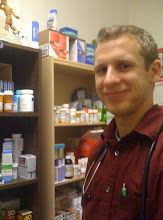Yukon Kuskokwim Regional Hospital
As to my credentials, I do not hold a master's or a doctorate, but I am a Yup'ik Eskimo and I was born into a world which no longer exists.
-- Harold Napoleon, Yuuyaraq: The Way of the Human Being
My first full day in Bethel went well. I had slept soundly through the night and had gotten up with plenty of time to stretch, practice a few kata in my limited space (how fitting the kata of the month would be Tekki!) and got ready to shower. I consider myself relatively up-to-date with plumbing fixtures and had seen a good share of quirks here and there, but for whatever reason I found it completely impossible to turn the shower on.
The knob twisted, but would not pull out, nor push in. No other button, lever, or dial was in site; I even tried flipping an extra light switch. Later I heard my roommate Erik get up and go into the bathroom. Seconds later, I heard the shower turn on. What had I done wrong. Soon after, Erik described the proper technique. "The first shower I had here was barely a trickle and was either scorching hot or frozen cold," he said, resting my concerns that perhaps it was me that had the problem. Still, he had at least gotten some liquid water from the pipes. The secret, it seemed, was to stand in the shower, grasp the knob with one hand, brace your body with the opposite hand on the shower wall, place one foot on the wall near the shower fixtures--and pull as if your life depended on it. This proved successful and exactly three minutes and forty-one seconds later, I was clean.
We walked outside toward the hospital, our parkas, hats, gloves, under armor, boots, and thick socks composing a veritable army against the -17 weather that greeted us. There was very little wind, which was a good thing. When the temperature dips below -15, even a slight wind can cause frostbite in just a short span of time. Our walk was about 5-10 minutes long and took us down the row of provided housing (all up on stilts), past the prison (yes, the housing is just over the fence from the prison), through what was described to me as "the gap in the prison fence," across the parking lot, and into the hospital.
The YK Regional Hospital is small yet the main location for health care for the entire delta. I met Mandy, my preceptor, in the inpatient pharmacy, where she was busy mixing a bag of unasyn. I asked if I could help and she put me to work, only after assuring me that I "won't have to do a lot of technician things. This is not a slave labor rotation." After that we ran around the hospital checking things off of her morning to-do list. I was then given my first project, which surprisingly, wasn't pharmaceutical, but cultural. I was to do a short presentation on some aspect of Yup'ik culture. Inspired by the previous night, I chose snares and trapping.
I had a long conversation with Sara, who works here in the pharmacy about crafting. The culture here is largely sustenance based--very few people simply have a job (which aren't numerous themselves). Sara engraves bone and makes jewelry that is simply astounding. We had a long discussion on Yup'ik culture and she showed me tundra tea--a low-lying conifer that can be picked and used to make tea. "It grows all over," she said, "you don't have to go far." I hope to learn more about edible local flora.
The rest of the United States is very different from here. Time and change has not been kind to the native populations in America. Sara explained how crafting was losing ground. There is something important about becoming good at something and doing it well, over and over. The people here have an understanding of tradition, perfection, and dedicated practice. Their character reflects it as well. Even in the hospital, people are smiling, say hello, and nod their heads. They are patient, caring, and respectful. This, in turn, makes health care a good deal easier for both providers and patients.


No comments:
Post a Comment